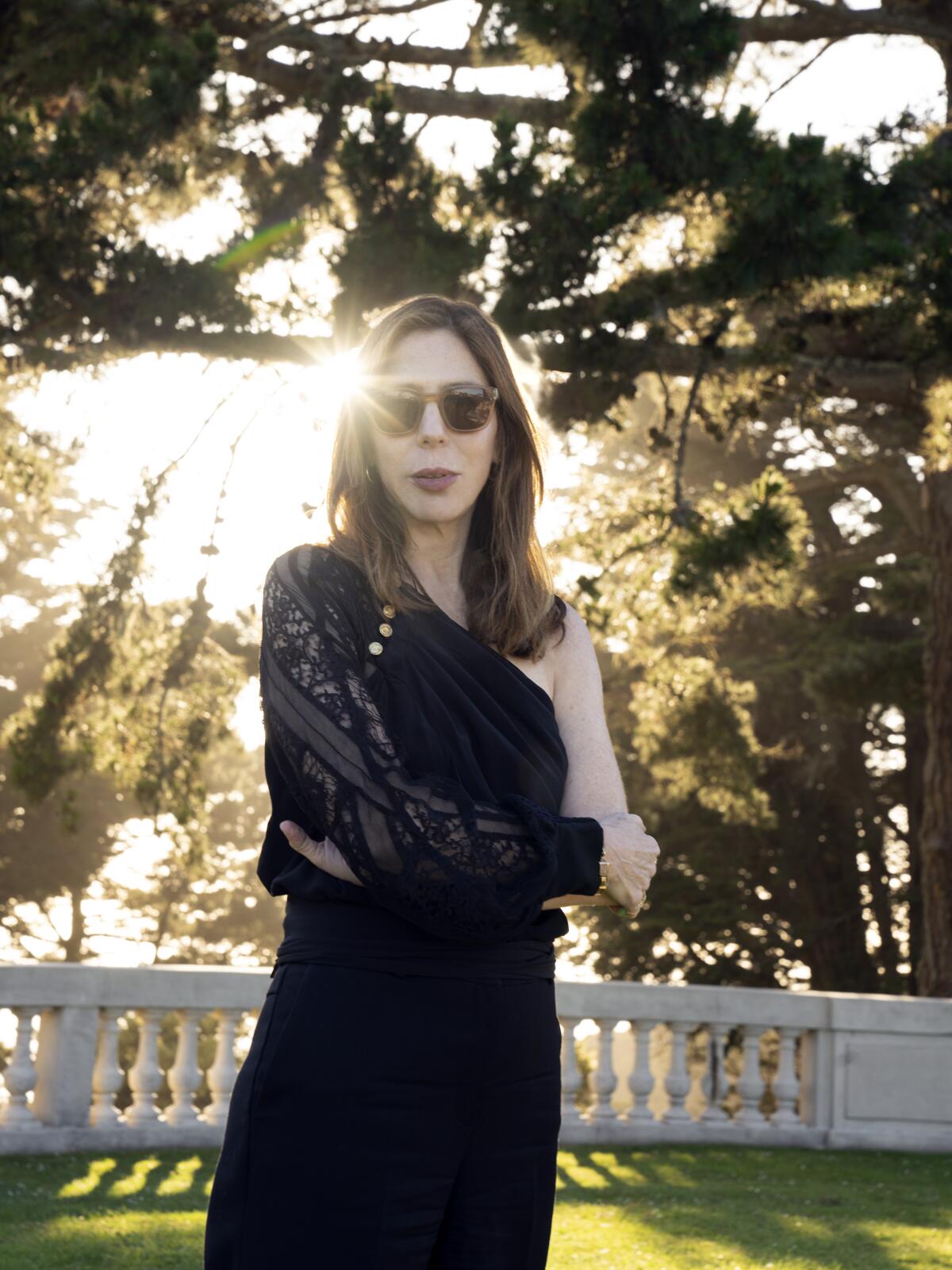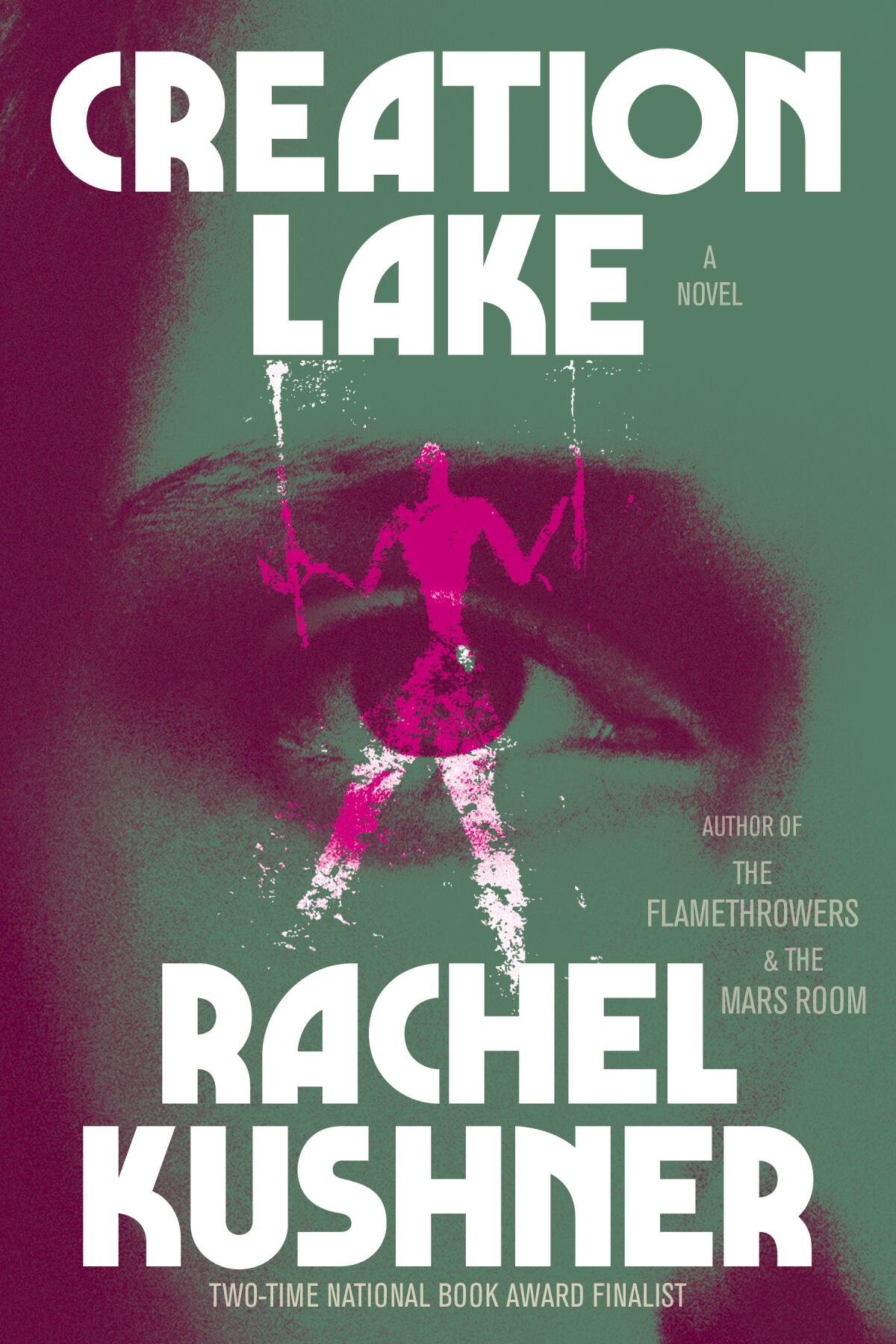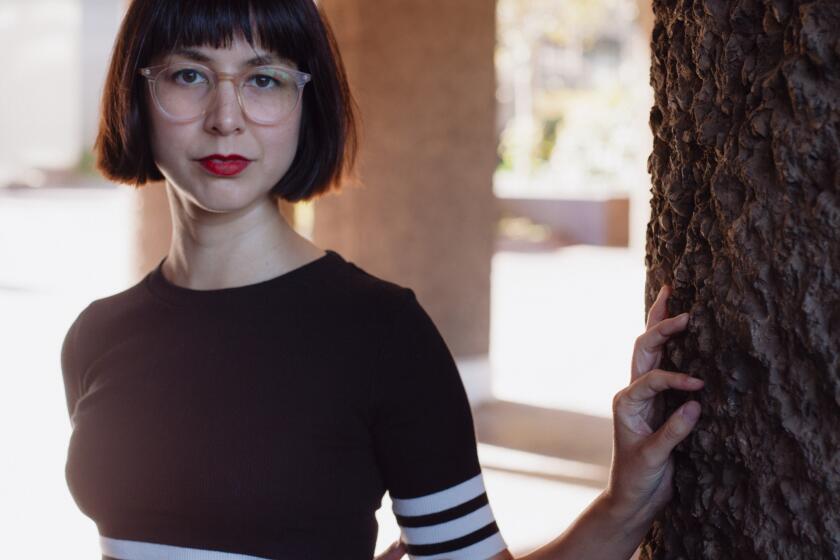An undercover agent aims to disrupt the work of climate activists in sexy, cerebral ‘Creation Lake’

- Share via
Book review
Creation Lake: A Novel
By Rachel Kushner
Scribner: 416 pages, $29.99
If you buy books linked on our site, The Times may earn a commission from Bookshop.org, whose fees support independent bookstores.
Buckle up: Known for her daring and cerebral work, Rachel Kushner knows how to take readers on a wild ride. Unafraid to blend edgy storytelling with excoriating sociopolitical commentary, her novels explore the scourge of colonization and empire, the American prison complex and the intersection between anarchy and art. In a recent interview with literary magazine the Drift, Kushner lays out her stakes, noting that a “novel is a retreat, made from a place of profound curiosity, and profound doubt. It’s never a polemic.” And yet, she sees the political potential embedded in novels as they “render the unseen seen.” The otherwise invisible dirty hands of power and money are exposed in her fourth novel.

In “Creation Lake,” her narrator is not who she presents herself to be. Unassuming Sadie Smith is squarely an antihero. But that’s not even her real name. The sole autobiographical detail that Sadie ever offers is that she is from Priest Valley, a place of no population that exists only as words on a sign on a barren California road. What we do know that her contemporaries do not: She’s a malevolent secret agent paid by governments, shadowy individuals or corporations to fold herself into activist communities with the intention to provoke behavior that disrupts their protests and political efforts. Hers is an absurdly lucrative, high-risk job that demands you put your body and sanity on the line. And it’s a career that comes with a shelf life: The possibility of death is greater than that of burnout. Are readers following what could be her last assignment?
Six months earlier, excavators designated for creating an industrial reservoir in the South of France were set on fire. The likely suspects were a commune of subversives in the Guyenne Valley known as Le Moulin, led by a charismatic and privileged young man named Pascal Balmy. For the powers that be who wanted nothing to stand in the way of their development, this unchecked behavior was unacceptable. With no clear link to Le Moulin’s guilt, only someone on the inside could uncover their culpability and dissolve the group — by any means necessary. Enter Sadie.
Kaliane Bradley proves imperialism, the scourge of bureaucracy and cross-cultural conflict can be utterly entertaining in ‘The Ministry of Time.’
As with every good spy novel, “Creation Lake” begins with sex and romance and leads to violence. To Sadie, Europe is not filled with picturesque landscapes. Instead, it’s “a borderless network of supply and transport.” In Paris, Sadie orchestrates an innocent meet-cute with a pretentious, wealthy filmmaker, hungry for her body and willing to accept her mysterious past, which opens the door for her to make her move into the granular work of Le Moulin. Lost on her way to their remote village, she finds herself adrift in what “felt like a place of aftermath.”
Using the framework of an espionage novel, Kushner creates a spellbinding story of intrigue and subterfuge that examines the limits of control and moral influence. Her nimble pacing and enigmatic details track the games people play, unconsciously or not, in the name of art and justice. With that tantalizing premise, Kushner can’t help but introduce a philosophical and historical undercurrent that builds and absorbs the reader as Sadie slowly moves toward her final objective.
Sadie comes to see that it’s no coincidence that radicals, titans of industry and government officials share a common, unstable delusion of power. Its influence tarnishes anything it touches. She posits, “The coincidence, as an explanation for things that are mysteriously aligned,” hides what is “instead a plot.” Beyond capital and control in a world of smoke and mirrors controlled by despots, what is the impulsive goal of humanity?
Humor mixes with a deep understanding of American foibles and the human heart to produce a riveting novel of ideas.
Someone else shares Sadie’s world-weary perspective. Bruno Lacombe, a former revolutionary turned meditative recluse, spends the bulk of his time living in a cave in an attempt to get closer to early man. He also serves as a mentor or guru to Le Moulin. To gain greater understanding of the forces at play in this commune, Sadie monitors Bruno’s emails to the group. Rather than stir up discontent, he eschews tactical conversation, concentrating on what fascinates him now. Regarding his previous life, Bruno remarks, “I left that milieu not to reject it but to find something else.” A veteran of the conflicts surrounding 1968 and their ricochet effects, he searches beyond his personal tragedy and the forces of society to mine for a more profound motivation.
Bruno’s obsession with the evolution of human behavior and desires tethers him to the Neanderthals. Did they die out because they lacked a ruthless drive to survive? Was it a brooding fascination with art that marked their fate? Lacking “mindful scholarship” of prehistoric art, Bruno is left to speculate that while Neanderthals were “conjurers” and “artists,” Homo sapiens were “copiers” and “frauds.” Are modern men beasts driven by power and control? Echoing the words in her Drift interview, Kushner bestows her wisdom onto Bruno, who remarks: “To render the unseen seen: That is what an artist does.” When the battles have been fought and the world’s resources are depleted, who is, in fact, best positioned for survival?
In Kailee Pedersen’s debut, generational pain and malice rule the narrative, with elements of the supernatural woven in.
A woman whose past has been scrubbed and abandoned as a prerequisite for her work, Sadie is entirely alone. Scarred by her previous projects, she’s got a cynical and sophisticated grasp on her work, but it also leaves her vulnerable. The intimacy of these illicitly retrieved emails offers Sadie a lifeline to the history of humankind guided by a man as solitary as she is. Bruno’s missives consider larger questions about the roots of our inner selves. While the unruly commune has little patience for his broad philosophical strokes, Bruno strikes a nerve with Sadie. His questions throw off her balance and shift her focus. She remains single-minded in the assignment to unsettle Le Moulin and topple a government deputy in the balance, but she’s unraveling at the seams at the same time. There is no stability in power.
“Creation Lake” is a sexy, physical novel of lies and caustic, increasingly harrowing choices tethered to ruin. Step by step, it demands we question what any of us are. Stripped of our names, our histories and any goals beyond successfully executing a project, who are we? Kushner also stresses what we hope to gain from any measure of striving, benevolent or otherwise, if we cannot face the painful truth of human intervention. Regarding the future, Sadie recalls Bruno’s reflection: “When we face our need to control it, we are better able to resist that need, and to live in the present.”
Many literary novelists have plumbed the murky depths of domesticity to question our collective existential crisis, while others have adopted genre writing for these explorations. Like Kushner’s “Creation Lake,” Eleanor Catton’s “Birnam Wood” and Kaliane Bradley’s “The Ministry of Time” are two high-wire novels that embody the pacing and tropes of spy novels. Whether the brooding autofiction of divorce or a cinematic drama, there’s an interesting overlap between these audacious novels: What’s left when you live your life as a lie? When do you face the truth? What’s the tipping point and how do you move on?
Kushner lands on openness as a space of opportunity. Bruno’s words linger with Sadie, acknowledging: “We want to escape what ails us, into something blessed, but know that when you go, you travel with cargo, stowaways, souvenirs from the old world. Don’t be afraid of them.” We can never shed our past and live in an ideal world, but “these things you’ve brought along will pass. Say hello and watch them go.” We cannot erase the past, but we can listen and strive to find a better world. Kushner brilliantly questions the impulses that lead to art and action but remains receptive to their potential. “Creation Lake” confronts the horror of industrialization, the desire to retreat in the face of conflict, and the need to remain present for all that’s to come.
Lauren LeBlanc is a board member of the National Book Critics Circle.
More to Read
A cure for the common opinion
Get thought-provoking perspectives with our weekly newsletter.
You may occasionally receive promotional content from the Los Angeles Times.













